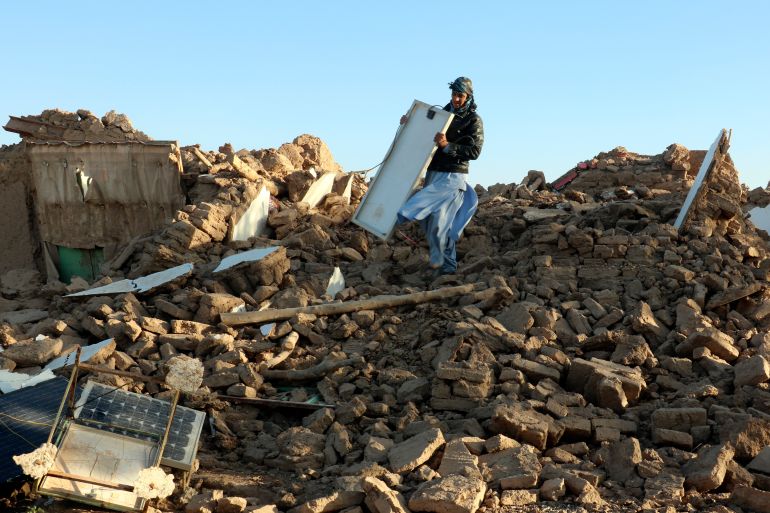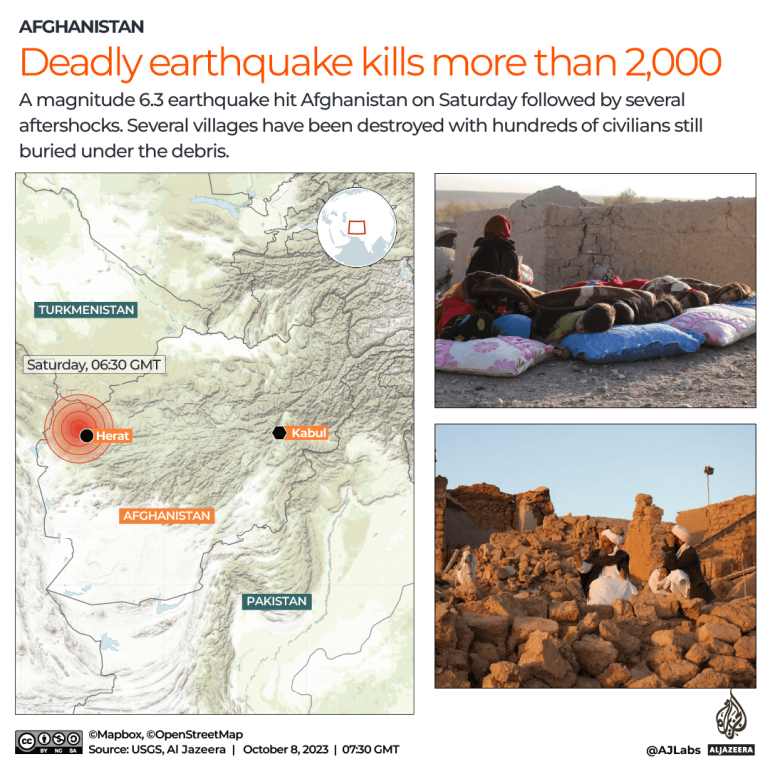Afghan earthquake rescue mission faces race against time
Many remain buried after Saturday’s earthquake in Afghanistan, as rescue teams intensify efforts to dig out survivors.

Rescuers are working around the clock to try to save thousands that remain buried following a powerful earthquake that hit Afghanistan’s Herat province on Saturday.
Rescue workers and volunteers are working around the clock to try to dig out survivors and bodies from the ruins of the villages worst affected, 48 hours after the 6.3 magnitude earthquake hit.
Keep reading
list of 4 itemsHow can we reduce global food insecurity?
Palestinian Prisoner’s Day: How many are still in Israeli detention?
‘Mama we’re dying’: Only able to hear her kids in Gaza in their final days
The Taliban’s Ministry of Public Health reports more than 2,500 are confirmed dead across 21 villages, but many more casualties are feared.
“Search and rescue operations remain ongoing, and the exact numbers of casualties and houses, premises, destroyed are still not fully confirmed,” a World Health Organization (WHO) official told Al Jazeera.
In the Zandehjan district, the epicentre of the quake, “100 percent of homes were totally destroyed,” according to the United Nations Office for the Coordination of Humanitarian Affairs (OCHA). The agency reports 1,023 dead and 1,663 injured in the district.
However, organisations and aid workers in the regional capital Herat told Al Jazeera that the casualty figures are much higher. “We have lost count,” one volunteer rescuer said.
“There are always discrepancies when issuing numbers for an event of this magnitude since verification can be challenging. But we can with some certainty say the numbers will increase dramatically as we rescue those still trapped,” said Necephor Mghendi, head of delegation at the International Federation of Red Cross and Red Crescent Societies (IFRC).
Challenges slow rescue efforts
The effort to find survivors has continued around the clock over the last two days, despite mounting challenges, not least frequent aftershocks.
“The geographic challenges in remote areas and continuous aftershocks have hindered the operations,” said a WHO spokesperson.
“The rescue workers are using everyday items to dig out victims. They don’t have sophisticated equipment and that is slowing down the effort,” Mghendi said.
For those affected, the delays could be the difference of life and death, said 50-year-old Ahmad, a survivor from Zandehjan.
“We lost pretty much everything. My father died and my wife is injured. We pulled her out of the debris with our hands. One of my kids is also injured and needs medical assistance,” he said.
Ahmad, who has been working tirelessly to help find others, pleaded for more support. “We need more medical tents and also people to help us dig through the ruins,” he said.
When found, survivors are taken to local overloaded clinics, he continued, adding, “People don’t have a home to return to.”
WHO officials have cautioned that lack of access to medical services is a major concern.
“In the aftermath of any disaster, women will continue to have babies, people with pre-existing medical conditions will still need their treatment, people will still have acute medical problems from a variety of causes. The maintenance and restoration of essential health care is vital,” the WHO spokesperson said.
The Red Cross also acknowledged an urgent need for emergency services, as well as other basics, said Mghendi. Shelter is the most urgent issue.
“The massive destruction of houses has left people exposed to the elements. Many don’t have a roof over their head and are vulnerable when the temperature drops at night,” he said. “There’s also a need for essential household items like utensils and water storage containers.”

Afghans filling international void
Despite the scale of the tragedy, there has been little international support or aid directed towards Afghanistan which, under Taliban rule, finds itself politically isolated.
The country is already facing a humanitarian crisis due to a significant reduction in foreign aid from Western countries since the Taliban takeover in 2021. Emergency services have been particularly affected.
Local organisations and philanthropists have stepped into the breach, however, mobilising humanitarian support for the survivors of the earthquake.
Cricketer Rashid Khan pledged his entire earnings from the 2023 Cricket World Cup to help affected families.
Nasrat Khalid, founder of Aseel, an Afghan e-commerce initiative that pivoted its work towards humanitarian support after 2021, said his organisation is working to provide aid to more than 1,000 families.
“We’re also building up the list of Omid IDs from the families that are directly affected have people who are injured or unfortunately has a member of the family killed in the tragedy,” he said, referring to digital cards they issue to recipients, to ensure transparent delivery of aid. The digital cards allow Aseel to ensure weekly follow-ups with verified families and track their progress.
Such organic efforts are crucial, said Khalid’s colleague Samira Gawhary.
“The international community’s response has been limited, with only a few organisations already working in Afghanistan providing support. We have witnessed a strong crowdfunding response on social media, but we have yet to receive substantial support from international donors and organisations,” she said, urging those who wished to extend support to make donations through the Aseel website.
Winter on the way
Humanitarian organisations working in Herat are also turning their attention to the approaching winter, which they warn is a major concern.
“Winter is less than two months away,” noted Mghendi. “Exposing people to sub-zero temperatures is a recipe for other health tragedies, so we’re racing against time to ensure that people have assistance not only for their immediate needs but also to cope for the coming winter.”
The urgency is summed up by Ahmad. The farmer is among those that have lost their homes and livelihoods.
“My house was destroyed and one of my cows killed. We don’t have a roof to sleep under, and the weather is getting cold. Last night, my kids were crying because of the cold, but there is no one to help” he said.
“We need help,” he pleaded.